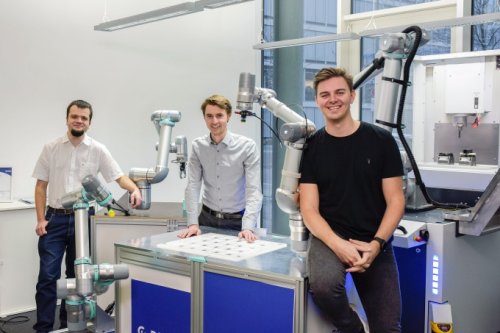EV Battery Training Initiative
Economic leaders and government officials gathered at the Automotive Hall of Fame in Dearborn to celebrate the latest investments in Michigan’s growing electric vehicle production: the closing on a $2.5 billion federal loan to help construct a battery cell facility in Lansing along with facilities in Ohio and Tennessee and a new battery workforce initiative. The EV Battery Training Initiative.
The loan from the U.S. Department of Energy to Ultium Cells LLC, a joint venture between General Motors and LG Energy Solutions, will support the new of lithium-ion battery cell manufacturing facilities in the three states. The project in Michigan is expected to create an estimated 3,700 jobs — including more than 2,000 construction jobs and 1,700 permanent operations jobs — U.S. Secretary of Energy Jennifer Granholm said during a news briefing.
She said that Michigan has “become a magnet for investment in battery manufacturing” and loans to the auto industry have helped facilitate the transition to electric vehicles.
“We began investing in car 2.0, the electric vehicle, and the batteries that form the guts of that vehicle,” Granholm said. “We got Michigan skating to where the puck is going. We’ve turned this state into a leader in electric vehicle manufacturing.”
Union Jobs
She touted a recent vote to unionize by workers at an Ultium plant in Ohio last week to join the United Auto Workers, saying it signaled that many of the jobs at the factories supported by her department’s loan to Ultium “are going to be union jobs.”Granholm said the loan advances President Joe Biden’s plan to reduce carbon pollution through encouraging Americans to make the switch to electric from gas-powered vehicles.The new Battery Workforce Initiative announced by Granholm will bring together business, labor and government leaders to develop strategies for recruiting and training workers for the battery manufacturing industry, the former Michigan governor said.
“These are parts of the supply chain that we’re building entirely from scratch,” Granholm said. “And we need to build a labor force alongside that supply chain.”
At the event announcing the initiative, Granholm was joined by U.S. Department of Labor Deputy Secretary Julie Su, Michigan’s Democratic U.S. Sens. Debbie Stabenow and Gary Peters, UAW President Ray Curry, Alliance for Automotive Innovation President and CEO John Bozzella and Ultium Vice President of Operations Tom Gallagher. Gov. Gretchen Whitmer was unable to attend the event. Michigan’s Chief Infrastructure Officer Zach Kolodin attended a roundtable discussion portion of the event in her place aimed at securing high-quality jobs in the budding battery industry.
In a statement Monday, Whitmer said the loan and workforce program will help secure Michigan’s manufacturing future. “As the state that put the world on wheels, high-tech manufacturing is part of both our past and our future. That’s why we’ve been working hard to outcompete other states for every dollar of investment, so everyone knows Michigan is the place to do business.”
Stabenow and Peters said that growth in the battery manufacturing sector represents a broader opportunity to boost domestic production.
“But in order to get that business, to bring it from offshore to the United States, we have to have workers that have the training,” Peters said, underscoring the importance of the workforce training announcement. “And if we don’t have that, we’re not going to get the business.”
Clean Energy Goal
The Biden administration has set a goal to achieve a 100% clean energy economy — reaching net-zero emissions by 2050. The administration’s plan to combat climate change through the widespread adoption of electric vehicles includes bolstering the domestic supply chain for electric vehicle production, incentivizing consumers to purchase electric vehicles and building more electric vehicle charging stations across the U.S.
Through these efforts, the administration hopes electric vehicles will make up half of new vehicle sales by 2030. GM seeks to build 1 million electric vehicles in North America by the end of 2025.
By then, Granholm said there will be 10 battery factories operating in the U.S., heralding the development as a “new chapter for this country’s industrial legacy” and “terrific news for the future of workers in America.”
Whitmer has celebrated previous investments in Michigan’s electric vehicle sector. Including the deployment of millions in taxpayer dollars to fund economic development projects in the industry. Whitmer joined economic development officials to announce two electric vehicle battery plants coming to Michigan. Providing $1 billion in incentives, tax breaks and other assistance from the state.
The EV Battery Training Initiative
But this latest investment in electric vehicle production in Michigan comes through a federal loan. The financing comes specifically from the Advanced Technology Vehicles Manufacturing program initially conceived by Stabenow in the Loan Programs Office. Housed in the U.S. Department of Energy. Ford received a $5.9 billion loan to upgrade several facilities in Michigan under the Advanced Technology Vehicles Manufacturing program. It was fully repaid this past summer, according to the U.S. Department of Energy.
The latest loan from U.S. Department of Energy marks the first one closed under the Advanced Technology Vehicles Manufacturing program. It is exclusively for a battery cell manufacturing project, according to the department. EV Battery Training Initiative.
https://www.techedmagazine.com/category/news/

